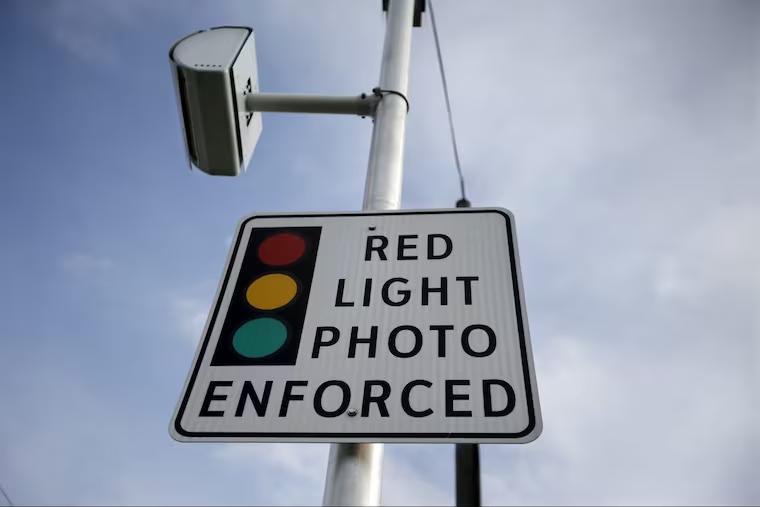Speed cameras for Roosevelt Blvd. face hard road in Pa. legislature
A bill to approve speed cameras, necessary for street safety in Philadelphia according to city officials, could be a tough sell in the state legislature.

Philadelphia planners hope speed cameras will play a significant role in the city's effort to make streets safer, but first, the technology needs to be legalized.
The path to legalization might be a rough one.
The effort was the focus of a panel Thursday morning at the Center City law offices of Montgomery, McCracken, Walker & Rhoads that was equal parts policy discussion, rally, and fund-raising event. The event was designed to boost support for pending legislation to allow the city to install speed cameras on Roosevelt Boulevard.
"It is absolutely necessary, and I don't know another way to slow people down," said Republican State Rep. John Taylor of Philadelphia, one of the bill's sponsors.
Speed plays a role in about half the traffic-related deaths in Philadelphia each year, said Sarah Clark Stuart, executive director of the Bicycle Coalition of Greater Philadelphia and a panelist at Thursday's event, sponsored by the Vision Zero Alliance.
Philadelphia has about 100 traffic-related fatalities a year (93 in 2017), and typically 10 percent happen on the Boulevard, she said. Of the nine fatal crashes on the Boulevard last year, seven involved pedestrians.
If authorized, cameras would snap an image of any vehicle driving 11 mph over the speed limit. The fine would be $150 for a first offense. The Boulevard would have up to nine speed cameras along nearly 12 miles, advertised by warning signs every two miles.
The legislation has been approved by the House transportation committee, which Taylor chairs. The challenge, he said, will be convincing House leadership to list the bill for a vote. That would need to happen by spring to give time for a vote in this legislative session, he said.
And there's another deadline approaching: Taylor, who has championed the bill, is retiring when his term expires this year.
Taylor also noted the political landscape in Harrisburg, which just completed a grueling budget process. The Pennsylvania House speaker, Republican Mike Turzai, is running for governor, and the majority leader, Republican Dave Reed, is running for Congress.
In that environment, he said, getting legislators to focus on a bill that will result in more speeding violations for their constituents is a tough sell. Taylor has combined the authorization for cameras on the Boulevard with another proposal for the cameras to be used on highway work zones to protect workers, something he thinks will be more palatable to legislators.
The Vision Zero Alliance, which is pushing safe streets efforts in Philadelphia, has hired a lobbying firm, Arena Strategies, to promote the bill and pitched to business leaders at Thursday's session the need for $50,000 to fund the effort, said Jason Duckworth, a developer and member of the Delaware Valley Smart Growth Alliance.
One of the most horrific crashes on the Boulevard killed a woman and three of her children. Samara Banks, 27, was crossing Roosevelt Boulevard with her sister and four children in July 2013 when she was struck by a car that had been drag racing. The driver of that vehicle was found guilty of homicide by vehicle, involuntary manslaughter, and reckless endangerment, though convictions on third-degree murder were later reversed by an appeals judge.
"There's people who don't agree with the speed cameras," said LaTanya Byrd, Banks' aunt, who spoke at Thursday's event. "We all want our lives to be safe. I just feel like we need to do this."
Byrd noted that some call the road "the Killovard."
Among the opponents is Thomas McCarey of the National Motorists Association, who says speed cameras are primarily a revenue generator for government. Making roads safer, he said, could be accomplished by timing traffic lights differently, adding more traffic enforcement, and putting crosswalks underground.
The Pennsylvania bill is written to keep the cameras from being a revenue generator, said Jana Tidwell, a spokeswoman from AAA. It ensures that the contractor responsible for the cameras would not make more money if more violations are issued, requires signs posted on roads to warn drivers that speed cameras are active in the area, and specifies that all revenue would go to the state's motor vehicle license fund, she said.
The speed camera program would likely be operated by the Philadelphia Parking Authority, which is now responsible for the red light cameras in Philadelphia. Fifty of Philadelphia's 134 red-light cameras are at nine Boulevard intersections, and violations have dropped there. Tidwell has said the cameras decreased right-angle crashes at those intersections.
The program, however, was marred by technical problems and mismanagement in 2016. Poorly calibrated cameras generated hundreds of thousands of false violations, which then had to be weeded out by PPA workers. That cost the agency $123,000 in overtime payments in 2016.
"Speed cameras will be an even bigger failure," McCarey said. "Speed cameras won't stop the 3 percent of wanton speeders endangering us all, only traffic cops can."
Overtime costs were significantly lower in 2017 after adjustments made to the cameras, PPA officials said.
The National Transportation Safety Board studied the role of speed in fatal crashes and found it was a factor in almost a third of all traffic-related deaths nationwide from 2005 to 2014. The federal transportation watchdog recommended speed cameras as an effective way to slow down drivers, noting another study found the cameras reduced all crashes by 49 percent and serious injuries and deaths by 44 percent.
If the House passes the speed camera bill, it would need to go back to the Senate for a vote on amendments and then return to the House for a final approval before going to the governor.